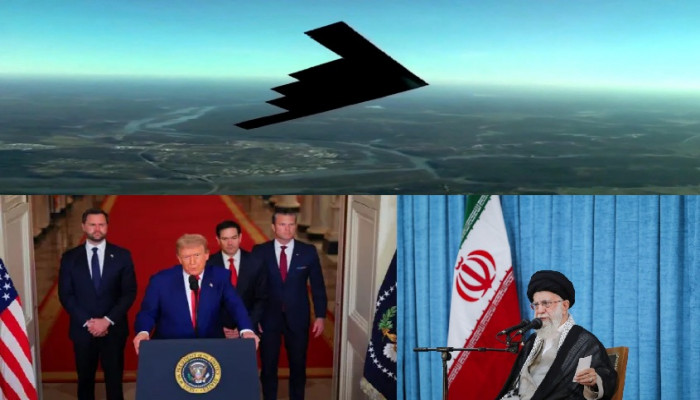Double Standards or Realpolitik? U.S. Playbook on Nuclear Brinkmanship Part 2
- In Military & Strategic Affairs
- 01:45 PM, Jun 27, 2025
- Ramaharitha Pusarla
The threat from Iran’s Islamic regime to Israel is clear, and a nuclear-armed Iran can be an existential danger to Israel. While an inverted logic continues to label Israel as the aggressor, a close look at the Ayatollah’s remarks approves of a jihadi war against Israel.
Iran’s Axis of Resistance is not a figment of imagination as Khamenei at a prayer sermon in February 2012 said, “We have intervened in the anti-Israel struggle, and the results have been the victories in the 33 days war [the 2006 war with Hezbollah in southern Lebanon] and the 22 days war [Israel’s attacks on the Gaza strip in December 2008]. From now on, we will also support any nation, any group that confronts the Zionist regime; we will help them, and we are not shy about doing so. Israel will go, it must not survive, and it will not”2.
Iran’s deeply entrenched anti-Zionism gradually evolved into a series of proxy wars- manifesting in cyberattacks, maritime sabotages and acts of terrorism. The ongoing Gaza conflict intensified the rivalry, culminating in two rounds of direct missile and drone retaliatory strikes in April and October 2024.
Operation Rising Lion has established Israeli dominance over Iranian airspace. With excellent operational synchronisation and superior Intelligence, Surveillance, Reconnaissance (ISR) capabilities, Israel prevailed over Iran in an operation that had tacit American approval. Even Israel’s cities, military and intelligence installations and economic hubs also suffered severe damage in the retaliatory strikes.
Vowing a complete destruction of Iran’s nuclear facilities, Israel refused to back down, raising fears of a full-blown war. A war in the Middle East dragged into its ninth day, in an unprecedented operation- ‘Midnight Hammer’, seven US B-2 bombers hurled 14 bunker bombs at the Iranian nuclear facilities- Fordow, Natanz and Isfahan.
Pulling out a shocker, President Trump sent out a chilling message through a comprehensive and devastating bombing. Since assuming office, Trump repeatedly stated, “Iran cannot have a nuclear weapon…. You cannot have peace if Iran has a nuclear bomb”. Shortly, as a retribution, Iran announced “Operation Tidings of Victory” to attack US bases in the region. However, barring America’s Al-Udeid base in Qatar, none have been hit. Iran had notified the US officials prior to the attack, minimising the losses, if any. Soon, Trump called for a ceasefire, and both countries, after their fair share of violations, abided by it.
Terming the attacks on the US base in Qatar a “slap in the face”, the Iranian regime claimed victory much like Pakistan after Operation Sindoor. The eerie similarities don’t end there, as Trump’s social media posts on the ceasefire in both cases had the same template, with the only difference being a change in names.
America’s blatant breach of Iran’s territorial airspace and the audacious air raid to bomb Iranian nuclear facilities sparked a global debate. Critics argue these actions undermine the UN, erode the foundations of international law and compromise the US’s moral standing in condemning the Russian invasion of Ukraine. Far from reinforcing deterrence, US strikes might inadvertently prompt countries to pursue nuclear weapons as a safeguard against external intervention.
On a different count, the US strikes have provided a temporary reprieve, enabling a broader momentum for the expansion of the Abraham Accords and the realignment of US Arab allies with Israel. A weakened Iran can shift the regional dynamics, opening new avenues for addressing the Gaza issue.
Satellite imagery revealing dotted truck convoys outside Iran’s Fordow facility—captured just before US strikes—has fuelled speculation that enriched uranium was covertly relocated to secure locations. While a decisive blow to Iran’s nuclear infrastructure might stall its ambitions, it is unlikely to extinguish them. Armed with technological know-how, Iran’s path to developing nuclear weapons would be delayed, not derailed.
The US justified its strikes on Iran citing its long-standing designation of a state sponsor of terrorism. Iran’s cultivated jihadi militia has ring-fenced Israel leading to regional insecurity. A parallel dynamic exists in the Indian sub-continent, where unmissable similarities emerge between the Islamic regime of Iran and the jihadi leadership in Pakistan. While Ayatollahs refused to bow down to US wishes, Pakistan has positioned itself as a compliant proxy of Western interests. In 1979, cleric Ayatollah seized power in Tehran - around the same time, Pakistan’s Zia-ul-Haq created the Afghan Mujahideen to take on the Soviet forces.
Pakistan under Zia became the most important player in America’s fight against the Communist USSR. Aligning governance with Islamic laws, Zia Islamised Pakistan. Despite his distaste for Western values, Zia consciously aligned with the US. Capitalising on its strategic geographic location, Zia allowed Pakistan to become a launch pad for America’s strategic pursuits in the region. As a result, Pakistan continues to remain in the good books of America despite its indubitable reputation as the ‘mothership of terrorism’. Pakistan is home to several internationally proscribed terror outfits. Indeed, eight Americans were killed in the Pakistani-based Lashkar-e-Taiba Mumbai attacks in 2008.
Grey-listed thrice by FATF for sponsoring terrorism, Ghazwa-e-Hind, the cornerstone of Pakistan’s anti-India policy, is an existential threat to India. The core tenets of Islamic regime of Iran and Pakistan are based on same jihadi ideology. But the US chose to turn a blind eye to Pakistan’s nuclear program and allowed it to accumulate a stockpile and make weapons.
For decades, Pakistan wielded cross-border terrorism as a geopolitical tool to destabilise India. Yet, unlike Iran, Pakistan enjoys the status of a major non-NATO ally of the United States. Adroitly managing the US, Pakistan has evaded international censure and continues to acquire advanced weaponry from the US. Adeptly kow-towing to the US strategic interests, Pakistan amassed a nuclear arsenal on par with India, while Iran, for merely approaching that threshold, faced punitive strikes.
Despite deep-rooted ideological divergences and lingering distrust, many Muslim-majority nations continue to pursue diplomatic engagement with the United States. While Islamic sentiment often shapes their foreign policy postures, geopolitical pragmatism prevails. Notably, Iran’s Supreme Leader has never concealed his antagonism toward Washington and never attempted to mend ties since the 1979 revolution.
Post-US air strikes, the Middle East might still witness a protracted period of instability. The Islamic regime, backed by the IRGC, is still under control and back in the saddle. Operation Rising Lion, much like the Ukrainian attacks on Russia, has exposed the presence of Mossad’s robust undercover network. Given the magnitude of the internal sabotage, Iranian authorities have swung into action to identify the moles. Iranians are yearning for freedom and secular democracy. But any external intervention can push the country into further chaos.
Pakistan and Iran, both epicentres of terrorism, pose a serious and imminent threat to global peace and stability. The spectre of a nuclear-armed state guided by a jihadi ideology is a geopolitical time bomb that demands urgent attention. While nations like North Korea and Iran face severe Western sanctions, Pakistan, despite its track record, continues to be shielded for its utility as a strategic ally. This glaring disparity in Western responses raises unsettling questions about the consistency and credibility of global non-proliferation efforts.
References
- https://irandataportal.syr.edu/wp-content/uploads/the-most-important-problem-of-the-islamic-world-selected-statements-about-palestine.pdf
- https://www.bostonreview.net/articles/ganji-khamenei-israel/
- https://www.euronews.com/2025/06/12/un-nuclear-watchdog-finds-iran-in-non-compliance-with-nuclear-obligations
- https://apnews.com/article/iran-nuclear-iaea-sanctions-728b811da537abe942682e13a82ff8bd
- https://observer.co.uk/news/international/article/the-history-of-now-israel-and-iran
- https://economictimes.indiatimes.com/news/defence/iran-israel-conflict-nuclear-strikes-how-secret-friends-turned-bitter-enemies/articleshow/121823591.cms
Disclaimer: The opinions expressed within this article are the personal opinions of the author. MyIndMakers is not responsible for the accuracy, completeness, suitability, or validity of any information on this article. All information is provided on an as-is basis. The information, facts or opinions appearing in the article do not reflect the views of MyindMakers and it does not assume any responsibility or liability for the same.







Comments